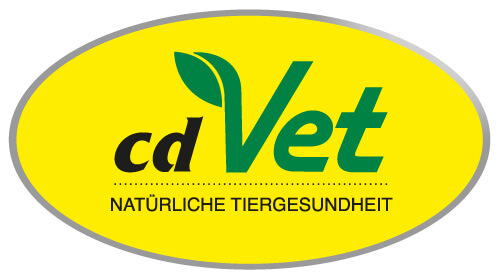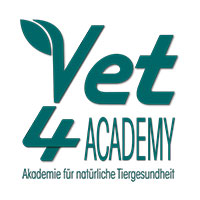This is the yellow of the egg
The route to love is through the stomach – even in horses. Our wide range of horse feed offers just the right choice for your horse's needs. Whether concentrated feed, minerals, high-quality oils or simply a treat as a reward. Here you will find what you are looking for!
Filter products
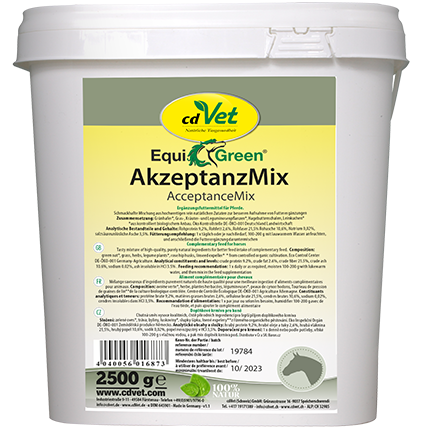
EquiGreen AcceptanceMix 2.5 kg
Complementary feed (powder) for horsesTasty mixture of high-quality, purely natural ingredients for better feed intake of complementary feedMetabolism and digestive system of horses, ponies, and donkeys are designed for the continuous intake of feed that is rich in raw fibres, low in energy and protein. Only through breeding of larger, heavy animals for work in the field, in front of the carriage, and under the rider, the feeding of grain as concentrate became necessary. However, the digestive system is actually not designed for such concentrate. The metabolism may also have problems processing these nutrients. This is especially the case with frugal, robust breeds of horses, as well as ponies and donkeys, in whose area of origin not much grain is available for feeding horses.Therefore, it is often problematic to feed these animals with complementary feed, as the usual concentrate and muesli feed contains cereals and is usually not good for them. But how then how to balance their often increased need for micronutrients? Sea minerals are essential for ponies that originally came from islands. Many North American horse breeds are attuned to the presence of mineral complexes in the soil, which are lacking in our country. Also otherwise, intensive agriculture has resulted in a much less species-rich and less diverse feed basis than in the past. This can also lead to deficits in the micronutrient area.But how can we now feed these important, sometimes less tasty nutrients without burdening the organism with potentially harmful concentrate or muesli food? The answer is EquiGreen AcceptanceMix, a tasty mix of high-quality, purely natural ingredients that is ideal for feeding complementary feed without burdening the metabolism and digestive tract. It is because it contains neither concentrated carbohydrates nor synthetic additives, and can help maintain the health of horses, ponies and donkeys, particularly those that are sensitive to metabolism. Especially for animals suffering from diseases of civilisation (founder, summer eczema, malanders, fecal water) and metabolic disorders (EMS Cushing, PSSM, Pyroluria etc.), which are becoming more and more frequent, the addition of concentrated natural micronutrients is very important, and therefore a feed that supports their intake.Composition: green oat*, grass, herbs, legume plants*, rose hip husks, linseed expeller*.*97% of the ingredients are from controlled organic cultivation. Eco Control Center DE-ÖKO-001, EU/non-EU agriculture.Analytical constituents: crude protein 9.2%, crude fat 2.6%, crude fiber 21.5%, crude ash 10.6%, ash insoluble in HCl 3.5%, sodium 0.02%.Feeding recommendation: 1 x daily or as required, moisten 100-200 g with lukewarm water, and then mix in the feed supplementation.
Content: 2.5 Kilogramm (€13.98 / 1 Kilogramm)
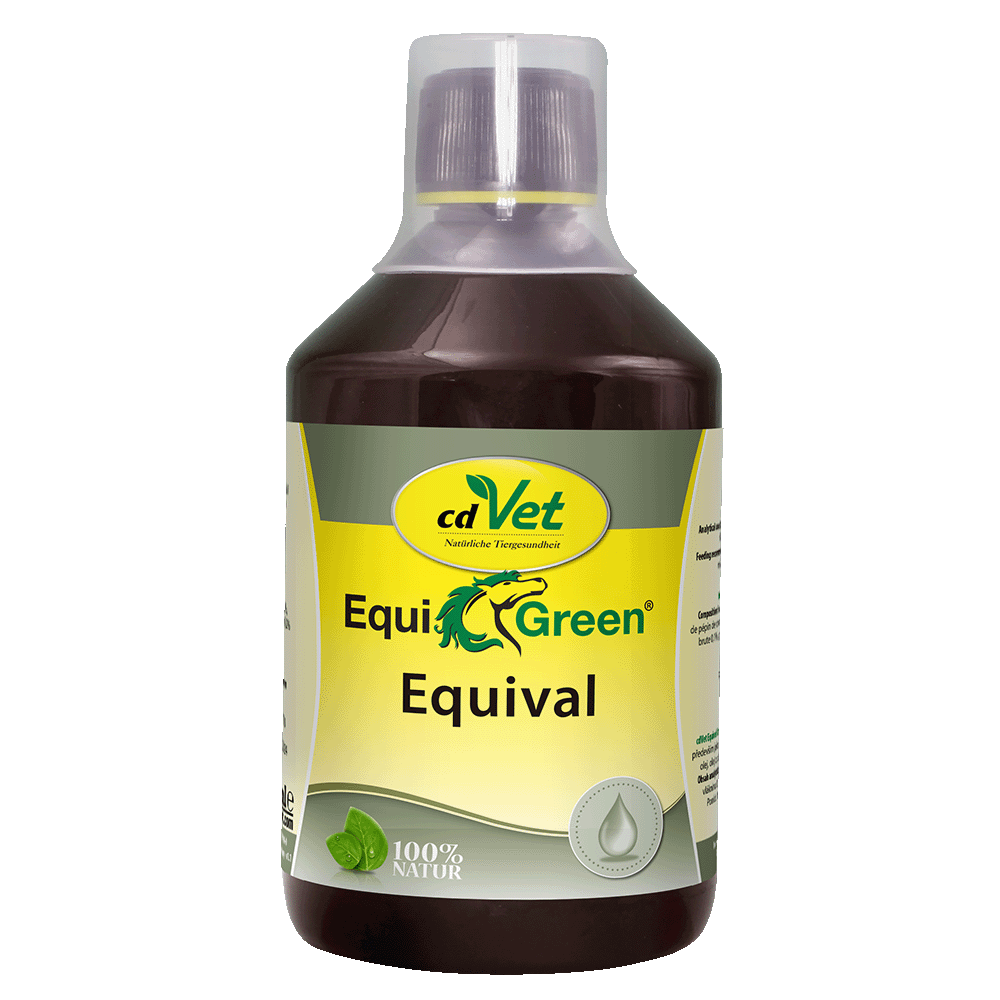
EquiGreen Equival 500 ml
Complementary feed for horsesEquiGreen Equival is a pure natural base oil and primarily intended as an optimal source of energyFeeding oil - with essential fatty acidsEquiGreen Equival is a mixture of high-quality cold-pressed vegetable oils. Cold-pressed food grade linseed oil forms the basis of this purely natural food oil. By the admixed function oils (evening primrose oil, wheat germ oil, pumpkin seed oil and argan oil) optimal, balanced supply is secured with essential fatty acids.Composition: linseed oil, evening primrose oil, wheat germ oil, pumpkin seed oil, argan oil.Analytical constituents: crude protein 0,1%, crude fat 99.6%, crude fiber 0,1%, crude ash 0,1%, sodium 0,02%.Feeding recommendation: as required, ponies: 10-30 ml, horses: 20-60 ml.After opening store in a cool and dark place, and use within 6 weeks!
Content: 0.5 Liter (€45.90 / 1 Liter)

EquiGreen HorseFitness 600 g
Complementary feed for horsesIntermittent feeding of broodmares and breeding horses, structure herbsEquiGreen Horsefitness is a tried and tested herbal mixture which is rich in natural minerals and bio flavones, which are only found in high-quality herbs. EquiGreen Horsefitness is also free of synthetic additives. It is suitable for the natural supplementation of rations of power feed for riding horses, broodmares and rearing horses. Together with EquiGreen MicroMineral it is an optimal basic supply.Composition: nettle, birch leaf, milk thistle, dandelion.Analytical constituents: crude protein 14.3%, crude fat 3.5%, crude fiber 17.9%, crude ash 12.1%, Calcium 1.82%, phosphorus 0.32%, sodium 0.39%.Feeding recommendation: 4 scoops once daily onto the feed, for mares in foal and young growing horses increase the amount given to 8 scoops once daily. One measuring spoon corresponds to about 2 g.
Content: 0.6 Kilogramm (€49.92 / 1 Kilogramm)
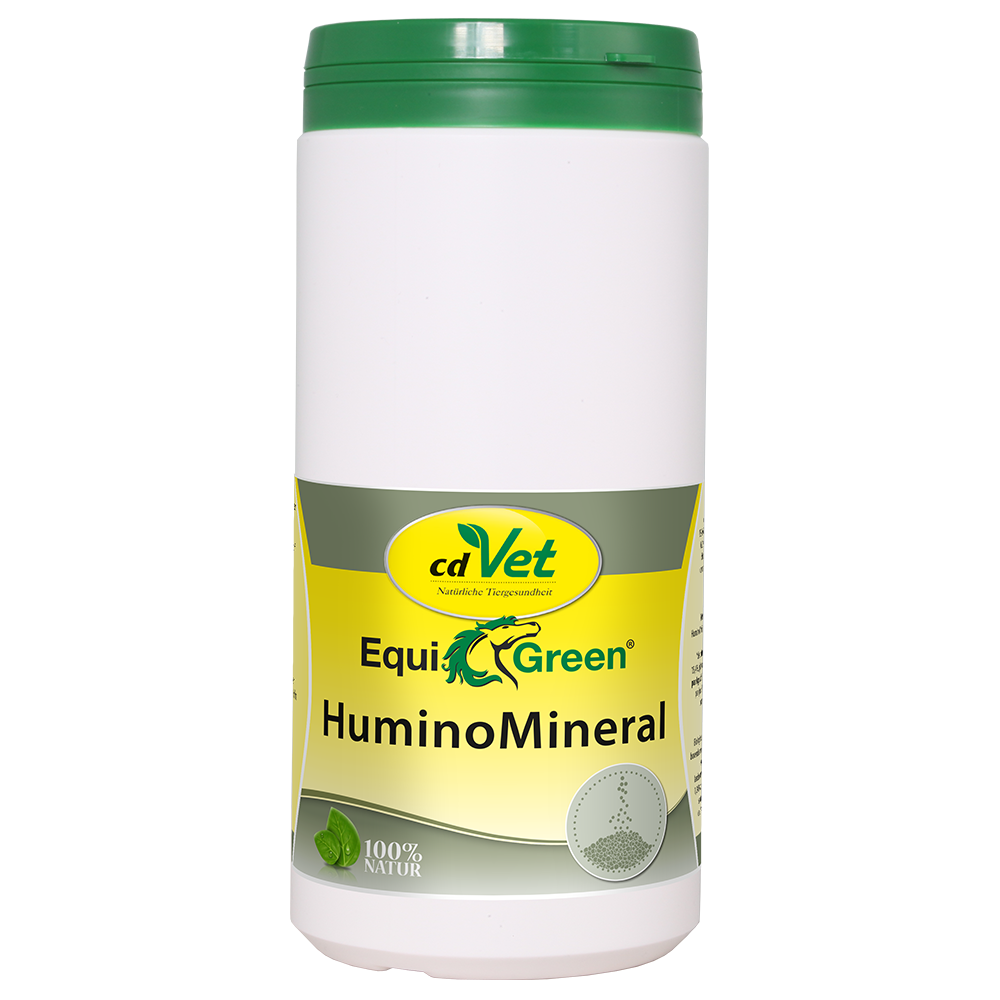
EquiGreen HuminoMineral 1 kg
Mineral complementary feed for horsesHigh-quality nutrient source with HuminoMin® complex, powderEquiGreen HuminoMineral cosists of the unique HuminoMin-Complex® and natural nutrients. It is rich in essential amino acids, vitamins, minerals, and trace elements. Particularly noteworthy is its high content of zinc and magnesium. EquiGreen HuminoMineral also contains a lot of folic acid as well as vitamin E, B vitamins, ß-carotene, sulfur, potassium, and selenium.Special feature of the HuminoMin® complex: Intestinal health and environmental conditions also play a role that should not be underestimated when it comes to the absorption and utilization of the required micronutrients. This is where the HuminoMin® complex comes in: Due to its elaborate composition, the mucous membranes of the stomach and intestine are protected and supported in their function, which favors the absorption of necessary micronutrients. In addition, the HuminoMin complex supports the regulation of acid-base balance and is characterized by excellent cell-protecting antioxidant properties.Due to the high toxin-binding properties of the HuminoMin® complex, toxins from bacteria and fungi or also toxins supplied from outside, such as glyphosate, are already bound in the intestine and excreted via the feces. This reduces the burden on the organism because the toxins do not enter the blood, and organs and tissues remain protected. The presence of glyphosate in more and more feedstuffs, of plant and also animal origin, can lead to a deficiency of micronutrients, although there would actually be enough minerals and trace elements. These nutrients cannot be absorbed because they are bound by glyphosate.HuminoMin® complex: • mucosal protection for stomach and intestine • toxin binding in the intestine • excellent feed conversion - micronutrients are better absorbed • cell protection through antioxidant properties • regulation of acid-base balance • support of the immune defense by balancing the lack of mineralsComposition: maerl, sunflower seed expeller, malt rootlets, seaweed meal, grape pips meal, brewers‘ yeast, brewers‘ yeast cell walls (MOS), peat.Additives/kg: Technological additives: clinoptilolite of sedimentary origin (1g568) 20 g.Total quantity of clinoptilolite of sedimentary origin from all sources shall not exceed the maximum content of 10000 mg/kg.Analytical constituents: calcium 15.4%, phosphorus 0.26%, sodium 0.26%, magnesium 1.04%, ash insoluble in HCl 6%.Feeding recommendation: Add approx. 30 g/animal daily to the feed. In case of special need (in the change of coat, in the last third of gestation, during lactation) the daily feeding amount should be increased to 60-120 g/animal. 1 tbsp. corresponds to ca. 11.5 g.
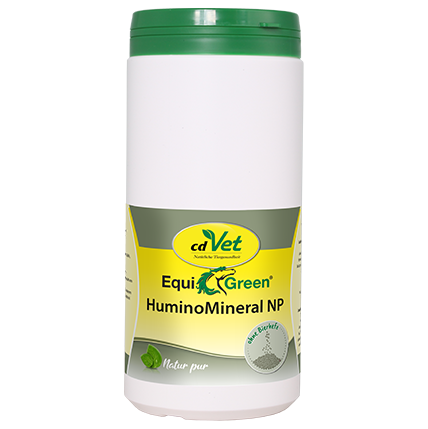
EquiGreen HuminoMineral NP 1 kg
Mineral complementary feed for horsesHigh-quality, bioavailable nutrient source based on the proven MicroMineral additionally with HuminoMin® complex without brewers’ yeast, powder.EquiGreen HuminoMineral NP combines the classic EquiGreen MicroMineral now with the unique HuminoMin® complex to create an unprecedented overall concept of vitality and nutrients. Sunflower seeds are naturally rich in essential amino acids, vitamins, minerals and trace elements. Particularly noteworthy is their high content of zinc and magnesium. They also contain a lot of folic acid as well as vitamin E, B vitamins, beta carotene, sulfur, potassium and selenium.Special feature of the HuminoMin® complex: gut health and environmental conditions also play a role that should not be underestimated when it comes to taking up and recycling the required micronutrients. This is where the HuminoMin® complex comes in: The ingenious composition protects and supports the function of the mucous membranes of the stomach and intestine, which favors the absorption of the necessary micronutrients.Due to the high toxin-binding properties of the HuminoMin® complex, toxins from bacteria and fungi or even externally added poisons such as glyphosate are already bound in the intestine and excreted via the faeces. This reduces the burden on the organism because it does not enter the blood and protect organs and tissues. The presence of glyphosate in more and more animal feeds - of plant and animal origin - is leading to more and more problems in the supply of minerals and trace elements. Because glyphosate has the property that it binds these micronutrients already in the soil as well as in the plant and in the carcass to insoluble complex compounds. These are therefore no longer available for the supply of the organism. It comes to a deficiency situation, although actually enough minerals and trace elements would be present, since these were bound by glyphosate so that they cannot be taken up. The fact that the HuminoMin® complex in turn binds glyphosate makes these vital nutrients better reusable by the body.In addition, the HuminoMin complex supports the regulation of acid-base balance and is characterized by excellent cell-protecting antioxidant properties.HuminoMin® complex:mucosal protection for the stomach and intestinestoxin binding (e.g., fungal, bacterial toxins, glyphosate, ...)excellent feed / food utilization - micronutrients are better absorbedcell protection through antioxidant propertiesregulation of acid-base balancesupports the immune defense by balancing the lack of mineralsComposition: maerl, sunflower seed expeller, seaweed meal, grape pips meal, peat.Additives per kg: Technological additives: clinoptilolite of sedimentary origin (1g568) 20 g.Total quantity of clinoptilolite of sedimentary origin from all sources shall not exceed the maximum content of 10000 mg/kg.Analytical constituents: calcium 14.1%, phosphorus 0.46%, sodium 0.45%, magnesium 1.2%, potassium 0.86%, ash insoluble in HCl 6.0%.Feeding recommendation: Add approx. 30 g/animal daily to the feed. In case of special need (in the change of coat, in the last third of gestation, during lactation) the daily feeding amount should be increased to 60-120 g/animal. 1 tbsp. corresponds to approx. 10 g.Store it cool and dry. Protect from direct sunlight.
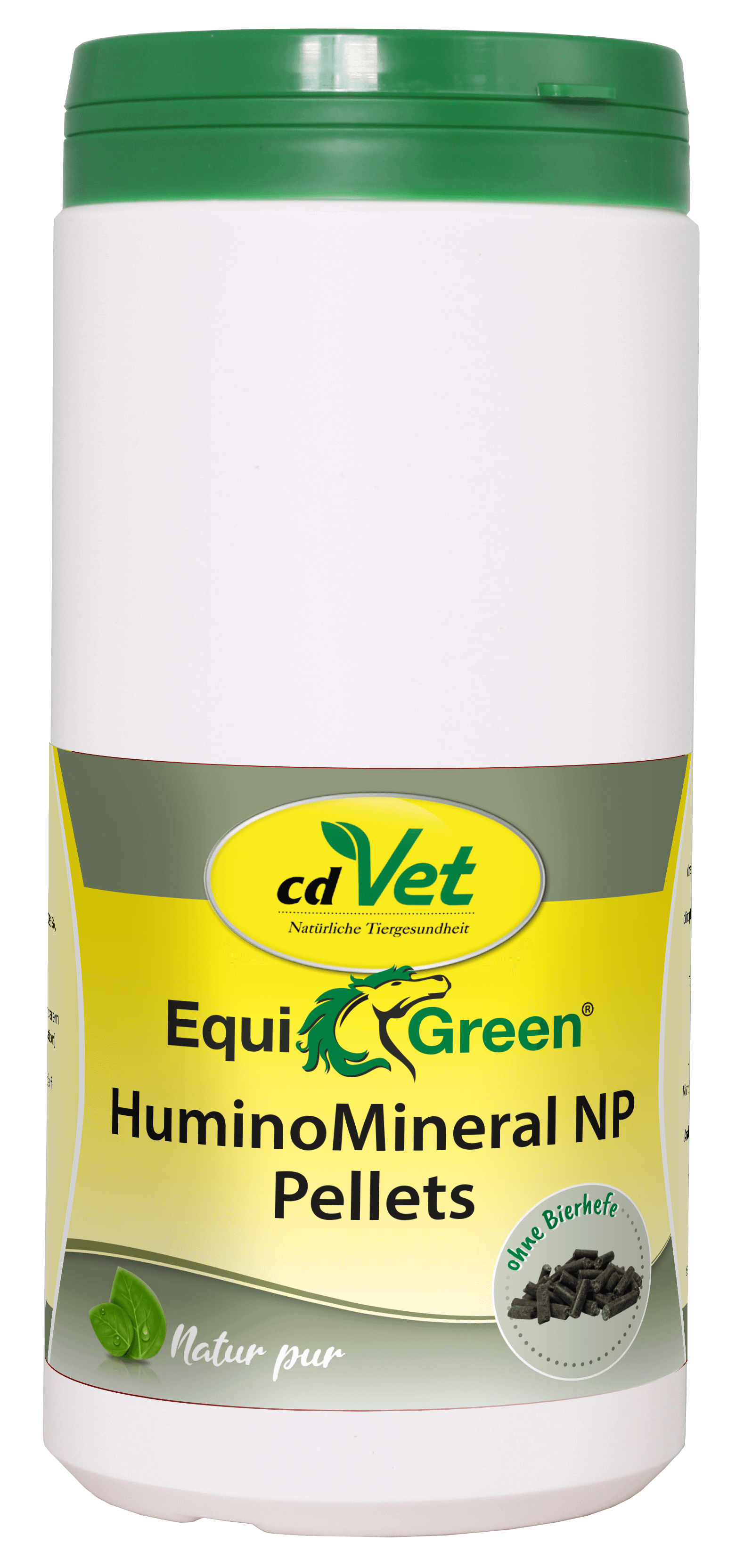
EquiGreen HuminoMineral NP Pellets 1 kg
Mineral complementary feed for horsesHigh-quality, bioavailable nutrient source based on the proven MicroMineral additionally with HuminoMin® complex without brewers’ yeast, pelletsEquiGreen HuminoMineral NP Pellets combines the classic EquiGreen MicroMineral now with the unique HuminoMin® complex to create an unprecedented overall concept of vitality and nutrients. Sunflower seeds are naturally rich in essential amino acids, vitamins, minerals and trace elements. Particularly noteworthy is their high content of zinc and magnesium. They also contain a lot of folic acid as well as vitamin E, B vitamins, beta carotene, sulfur, potassium and selenium.Special feature of the HuminoMin® complex: gut health and environmental conditions also play a role that should not be underestimated when it comes to taking up and recycling the required micronutrients. This is where the HuminoMin® complex comes in: The ingenious composition protects and supports the function of the mucous membranes of the stomach and intestine, which favors the absorption of the necessary micronutrients.Due to the high toxin-binding properties of the HuminoMin® complex, toxins from bacteria and fungi or even externally added poisons such as glyphosate are already bound in the intestine and excreted via the faeces. This reduces the burden on the organism because it does not enter the blood and protect organs and tissues. The presence of glyphosate in more and more animal feeds - of plant and animal origin - is leading to more and more problems in the supply of minerals and trace elements. Because glyphosate has the property that it binds these micronutrients already in the soil as well as in the plant and in the carcass to insoluble complex compounds. These are therefore no longer available for the supply of the organism. It comes to a deficiency situation, although actually enough minerals and trace elements would be present, since these were bound by glyphosate so that they cannot be taken up. The fact that the HuminoMin® complex in turn binds glyphosate makes these vital nutrients better reusable by the body.In addition, the HuminoMin complex supports the regulation of acid-base balance and is characterized by excellent cell-protecting antioxidant properties.HuminoMin® complex:mucosal protection for the stomach and intestinestoxin binding (e.g., fungal, bacterial toxins, glyphosate, ...)excellent feed / food utilization - micronutrients are better absorbedcell protection through antioxidant propertiesregulation of acid-base balancesupports the immune defense by balancing the lack of mineralsComposition: maerl, sunflower seed expeller, seaweed meal, grape pips meal, peatAdditives per kg: Technological additives: clinoptilolite of sedimentary origin (1g568) 20 gTotal quantity of clinoptilolite of sedimentary origin from all sources shall not exceed the maximum content of 10000 mg/kg.Analytical constituents and levels: calcium 14.1%, phosphorus 0.46%, sodium 0.45%, magnesium 1.2%, potassium 0.86%, ash insoluble in HCl 6.0%Feeding recommendation: Add approx. 30 g/animal daily to the feed. In case of special need (in the change of coat, in the last third of gestation, during lactation) the daily feeding amount should be increased to 60-120 g/animal.Store it cool and dry. Protect from direct sunlight.
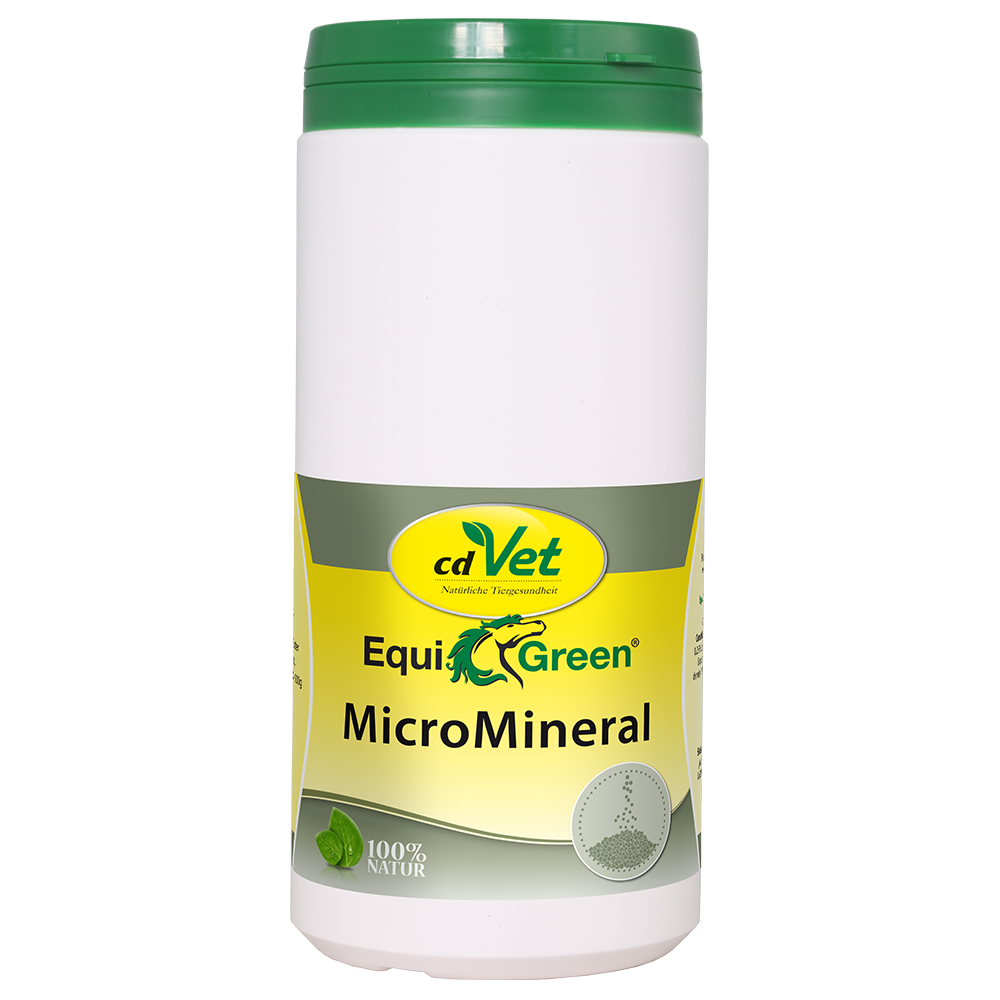
EquiGreen MicroMineral 1 kg
Mineral feed for horsesFor the appropriate feeding of horsesOptimal daily nutritional supplementation - minerals, trace elements, vitamins, powderEquiGreen MicroMineral contains 100% purely natural ingredients, which are rich in natural and easily available micronutrients like minerals, trace elements, vitamins etc. and due to their vegetable origin the detoxification organs are not being overstrained anymore, whereby an optimal and natural micro nutrition is made possible with calcium, magnesium and a complete complex of essential trace elements and alginates. Special attention to optimal micro nutrition:- In growth- In fur changing- In training and competition use- In breeding- At stress- At problems with fur and skin- At older animals- At metabolism problems and allergies - At hoof problemsPossible consequences of deficiencies of trace elements and micronutrients:- Problems at fur changing- Scaly skin- Dull fur - Delay in development - Degeneration of bones and joints- Weakened immune system- susceptibility to stress- poor hoof quality- birth difficultiesFeeding as close to nature as possible is the basic prerequisite for horse health and performance. As an herbivore oriented in continuous intake of raw fiber-rich, low-energy and low-protein feed, the detoxification capacity of the horse liver is also limited and is easily overloaded by nutrient-rich feed, environment and other toxins but also by synthetic vitamins etc. This can contribute to feared metabolic problems, such as EMS, PSSM, etc., which are becoming increasingly common nowadays.EquiGreen MicroMineral is a natural, optimal dietary supplement in the trace and micronutrient range. Especially in the case of the feeding of prefabricated feeds, a shortage situation is quickly created, because industrial and thermal processing causes many substances to be damaged, altered or destroyed. Synthetics cannot completely remove this deficiency. Therefore, EquiGreen MicroMineral should not be missed.Tip of an expert: Deficiency symptoms can also be caused by a disturbed bowel function or disturbance of the intestinal flora. Therefore it is advisable to feed EquiGreen GutClean with the following feeding with EquiGreen GutActive to improve the absorption capacity.Composition: maerl, brewer‘s yeast, malt rootlets, seaweed meal, grape pips meal.Analytical constituents: calcium 17.0%, magnesium 1.25%, potassium 0.65%, phosphorus 0.25%, sodium 0.65%, ash insoluble in HCl 6.0%.Feeding recommendation: daily 3.5 measuring spoons (25 g) over the feed. In particular need e.g. coat change, in the last 1/3 of gestation, as well as during lactation, the feeding quantity should be increased to 50-100 g. 1 measuring spoon is approx. 7 g.
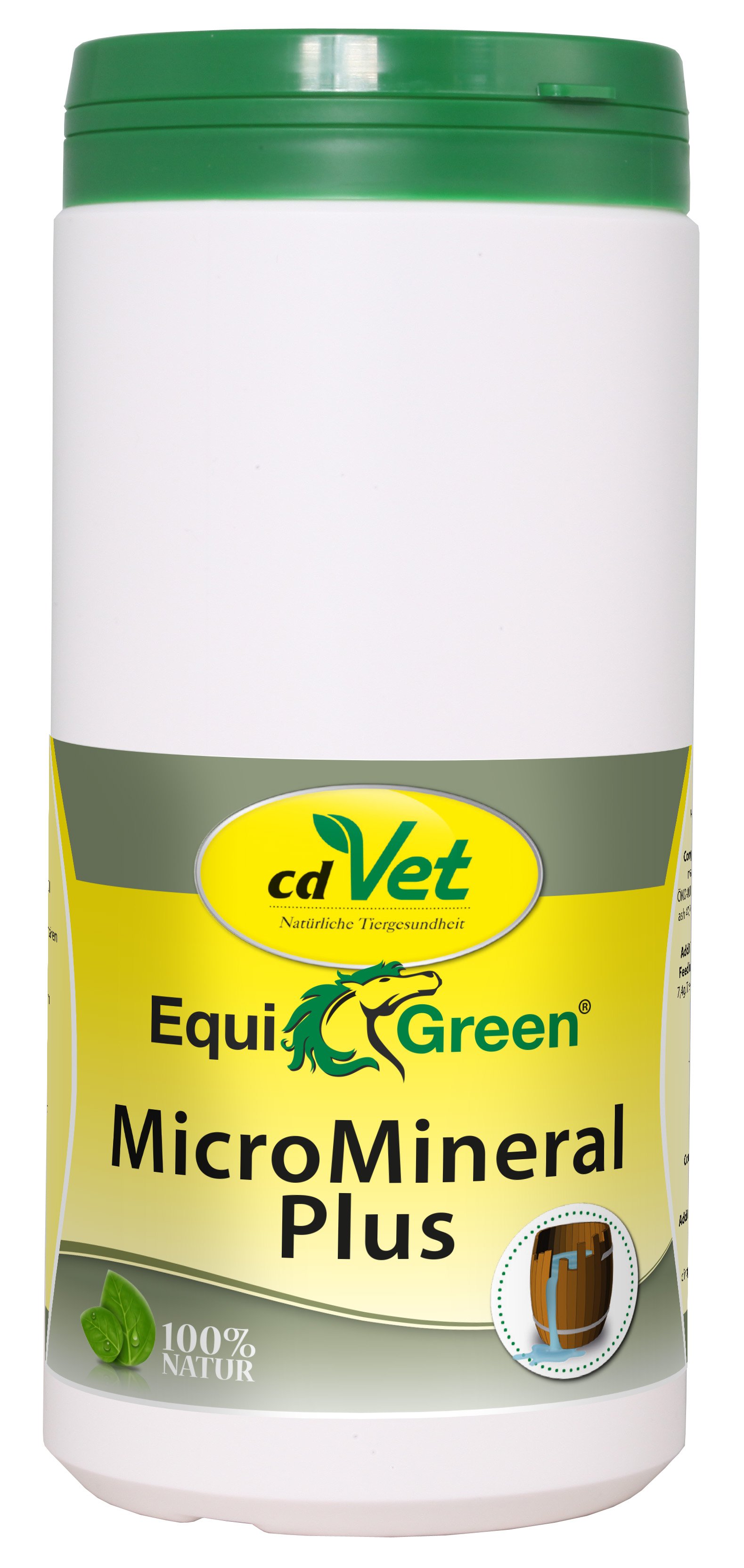
EquiGreen MicroMineral plus 1 kg
Mineral complementary feed (powder) for horsesHigh quality source of minerals, vitamins, essential amino acids, and humic acidsFor more than 10 years, cdVet MicroMineral has been an innovation when it comes to the simple basic supply of mineral and vital substances in all areas. Its natural ingredients, rich in readily available micronutrients, such as minerals, trace elements, vitamins, etc., can prevent deficiency situations.EquiGreen MicroMineral plus now combines this experience with moringa and peat to create an unprecedented total concept of vitality and nutrients. Moringa stands out with 90 important nutrients, vitamins, and minerals, all essential amino acids and secondary plant substances in highly concentrated form. In addition, peat is rich in humic acids, which are able to bind excess stomach acid and harmful substances in the intestine.Excellent source of vitamins and mineralsMoringa supports muscle developmentNatural source of iron - can stimulate blood formationGastrointestinal regulation through humic acidsCell protection through antioxidantsComposition: maerl, malt rootles, sunflower seed expeller, seaweed meal, grape pips meal, brewers‘ yeast, brewers‘ yeast cell walls (MOS), moringa 5%, peat 3%.Additives/kg: Technological additives: clinoptilolite of sedimentary origin (1g568) 20 g.Total quantity of clinoptilolite of sedimentary origin from all sources shall not exceed the maximum content of 10000 mg/kg.Analytical constituents: crude protein 10.3%, crude ash 47.7%, crude fiber 8.2%, crude fat 3.0%, ash insoluble in HCl 6%, calcium 16.4%, phosphorus 0.26%, sodium 0.31%.Feeding recommendation: Add daily 5 g/100 kg body weight to the feed. In case of special need, e.g. during the change of coat, in the last third of pregnancy as well as during lactation, the feeding amount should be increased to 10-20 g/100 kg body weight. 1 tbsp. corresponds to approx. ca. 11.5 g.
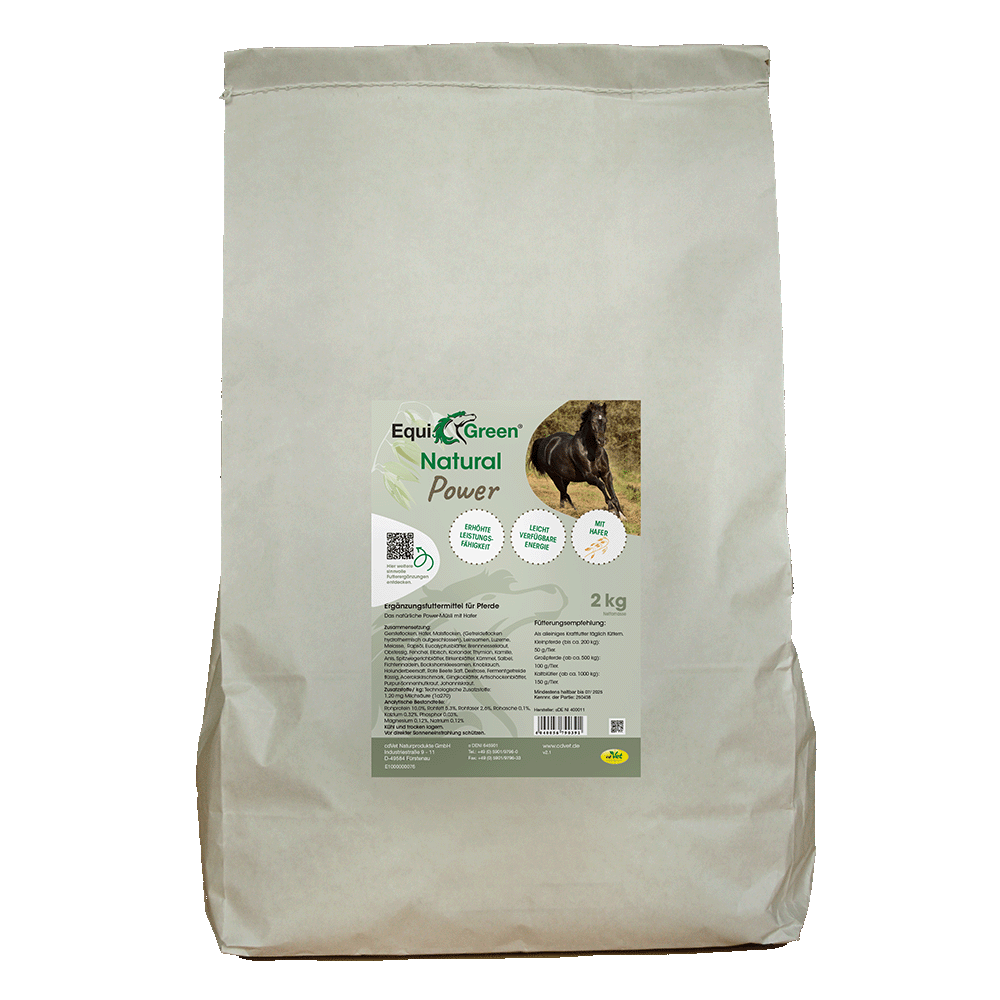
EquiGreen Natural Power with Oats 2 kg
Complementary feed (muesli flakes) for horsesThe natural power muesli with oatsEquiGreen Natural Power meets the high demands that we at cdVet place on a concentrated feed for the sensitive herbivore horse: Easy digestibility directly in the small intestine thanks to high-quality ingredients such as hydrothermally digested grain and the absence of waste products and fillersFast, readily available energy without disturbing the sensitive colon flora, which is designed for roughageLower amounts of concentrated feed with better digestibility and energy supply, which, in combination with sufficient good roughage, is easy on the sensitive, small horse's stomach and the entire digestive system, which is designed for feed rich in crude fiberFree of synthetic vitamins, inorganic bound and artificially produced organic minerals and trace elementsMicronutrient supply exclusively via high-quality natural raw materialsNo unnecessary strain on the sensitive detoxification organs of the steppe animal horse due to synthetic additives that are difficult to metabolizeSupply of vital minerals, trace elements, vitamins, and other vital substances from natural sources on which the entire organism is designedHigh-quality plant and herbal supplements compensate for the lack of herbs on today's pasturesImproved health and increased performanceComposition: barley flakes, oat flakes 25%, maize flakes, (cereal flakes hydrothermally digested), linseed, alfalfa, molasses, rapeseed oil, eucalyptus leaves, stinging nettle herb, fruit vinegar, fennel, marshmallow, coriander, thyme, chamomile, aniseed, ribwort plantain leaves, birch leaves, cumin, sage, spruce needles, fenugreek seeds, garlic, elderberry juice, red beet juice, dextrose, fermented cereals (liquid), acerola cherry pulp, gingko leaves, artichoke leaves, purple coneflower herb, St. John's wortAdditives/kg: Technological additives: lactic acid (1a270) 1.2 mg.The simultaneous use of different or ganic acids or their salts is contraindi cated where one or more of them is used at or near the maximum permitted content.Analytische Bestandteile: Rohprotein 10,0%, Rohfett 5,3%, Rohfaser 2,6%, Rohasche 0,1%, Kalzium 0,32%, Phosphor 0,03%, Magnesium 0,12%, Natrium 0,12%Feeding recommendation: Feed daily as sole concentrate. Small horses (up to ca. 200 kg): 50 g/animal. Large horses (from ca. 500 kg): 100 g/animal. Cold-blooded horses (from ca. 1000 kg): 150 g/animal.Store it cool and dry. Protect from direct sunlight.
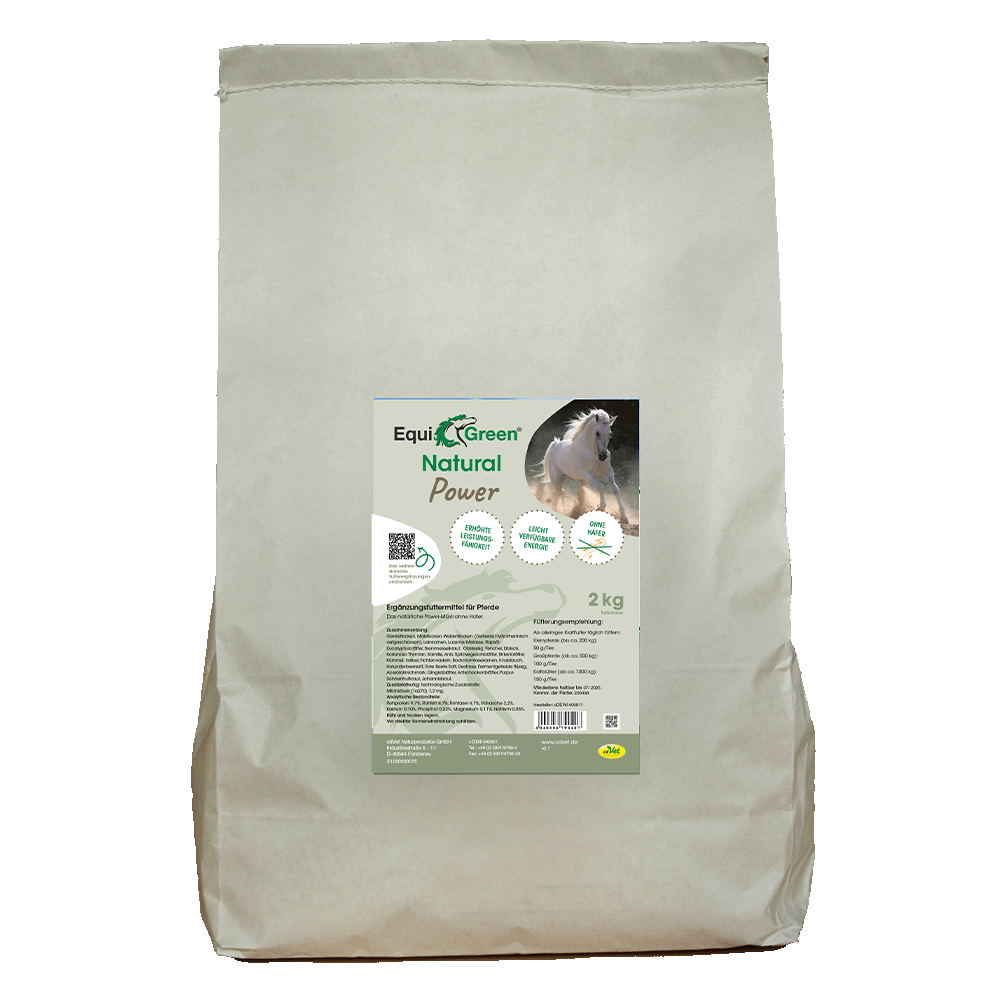
EquiGreen Natural Power without Oats 2 kg
Complementary feed (muesli flakes) for horsesThe natural power muesli without oatsEquiGreen Natural Power meets the high demands that we at cdVet place on a concentrated feed for the sensitive herbivore horse: Easy digestibility directly in the small intestine thanks to high-quality ingredients such as hydrothermally digested grain and the absence of waste products and fillersFast, readily available energy without disturbing the sensitive colon flora, which is designed for roughageLower amounts of concentrated feed with better digestibility and energy supply, which, in combination with sufficient good roughage, is easy on the sensitive, small horse's stomach and the entire digestive system, which is designed for feed rich in crude fiberFree of synthetic vitamins, inorganic bound and artificially produced organic minerals and trace elementsMicronutrient supply exclusively via high-quality natural raw materialsNo unnecessary strain on the sensitive detoxification organs of the steppe animal horse due to synthetic additives that are difficult to metabolizeSupply of vital minerals, trace elements, vitamins, and other vital substances from natural sources on which the entire organism is designedHigh-quality plant and herbal supplements compensate for the lack of herbs on today's pasturesImproved health and increased performanceComposition: barley flakes, maize flakes, wheat flakes (cereal flakes hydrothermally digested), linseed, alfalfa, molasses, rapeseed oil, eucalyptus leaves, stinging nettle herb, fruit vinegar, fennel, marshmallow, coriander, thyme, chamomile, aniseed, ribwort plantain leaves, birch leaves, cumin, sage, spruce needles, fenugreek seeds, garlic, elderberry juice, red beet juice, dextrose, fermented cereals (liquid), acerola cherry pulp, gingko leaves, artichoke leaves, purple coneflower herb, St. John's wortAdditives/kg: Technological additives: lactic acid (1a270) 1.2 mg.The simultaneous use of different or ganic acids or their salts is contraindi cated where one or more of them is used at or near the maximum permitted content.Analytical constituents: crude protein 9.7%, crude fat 4.7%, crude fiber 4.7%, crude ash 2.2%, calcium 0.10%, phosphorus 0.32%, magnesium 0.11%, sodium 0.03%Feeding recommendation: Feed daily as sole concentrate. Small horses (up to ca. 200 kg): 50 g/animal. Large horses (from ca. 500 kg): 100 g/animal. Cold-blooded horses (from ca. 1000 kg): 150 g/animal.Store it cool and dry. Protect from direct sunlight.
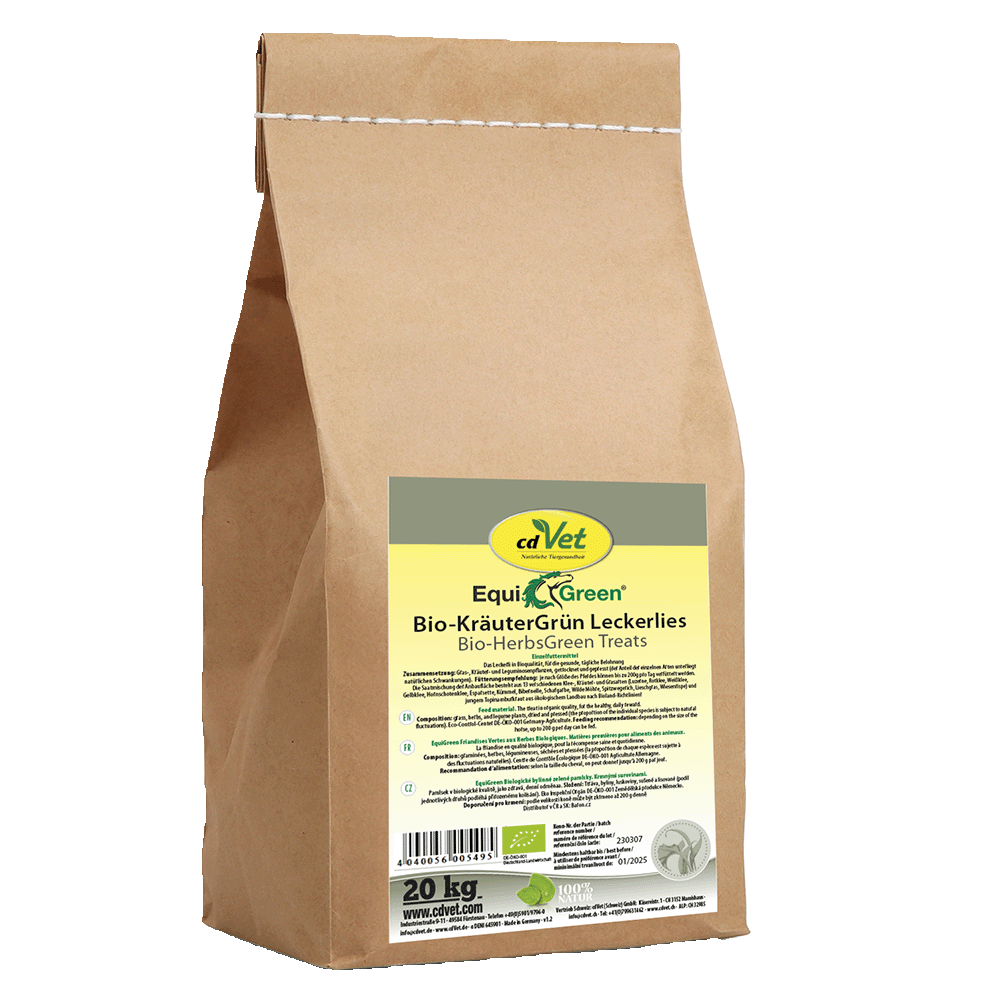
EquiGreen Organic HerbalGreen Treats 20 kg
Feed materialsThe treat in organic quality, for the healthy, daily rewardEquiGreen Organic HerbalGreen Treats are practical to use and a high quality complementary feed at the same time. They fit in any pocket without sticking or smearing. The healthy reward is of course free of cereal starch and additives, therefore also suitable for horses with PSSM, EMS, and ECS.Composition: grass, herbs, and legume plants, dried and pressed (the proportion of the individual species is subject to natural fluctuations). Eco-Control-Center DE-ÖKO-001 Germany-Agriculture.Analytical constituents: crude fiber 24.1%.Feeding recommendation: depending on the size of the horse, up to 200 g per day can be fed.The seed mixture of the cultivated area consists of 13 different clover, herb and grass species (alfalfa, red clover, white clover, hop clover, bird‘s-foot trefoil, sainfoin, meadow caraway, burnet-saxifrage, yarrow, wild carrot, ribwort plantain, timothy-grass, smooth meadow-grass) and young Jerusalem artichoke herb from organic farming according to Bioland guidelines!
Content: 20 Kilogramm (€5.30 / 1 Kilogramm)
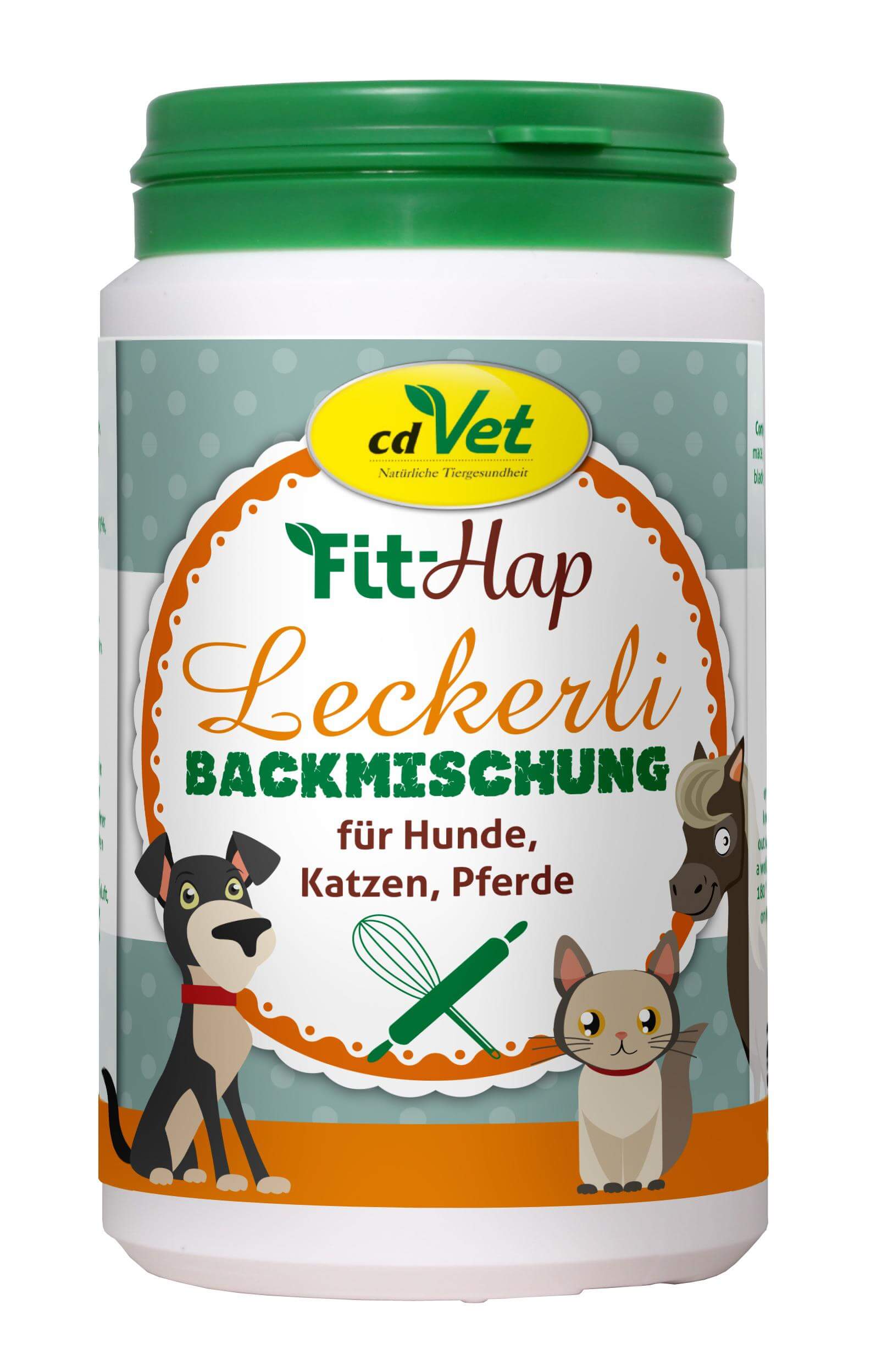
Fit-Hap Baking Mix Treats 180 g
Complementary feed for dogs, cats and horsesIndividual, healthy treats for your darlingBaking cookies itself is not a lot of effort and for fur nose, velvet paw and horses are a delight. The advantages are: they can fit bake for taste of the animal and know exactly what‘s inside. Many bought treats are colorings, attractants or preservatives and often contain sugar. It is dispensed in the home-made cookies, of course.Expert Tip: Narrow down depending on the species and on the preferences of your four-legged companion individually with ground beef, tuna, shredded carrots or bananas, the cake mix.If you change the recipe, you should vary the amount of water somewhat.Composition: extracted spelled flour, beetroot, linseed, rosehip, mearl, Aronia pomace, strawberry pomace, brewer‘s yeast, malt rootles, apple pulp, blackcurrant pomace, seaweed meal, grape pips meal.Analystical constituents: crude protein 12.8%, crude fat 6.2%, crude fiber 5.6%, ash 7.3%, sodium 0.08%How to use: Whole mixture for one portion of dough.Since homemade cookies contain no artificial preservatives, they are only a maximum of 2 - 3 weeks stable (whole meal biscuits), or a few days („ meat biscuits "). The best preserved one in the refrigerator on or freezes them in portions.Baking instructions:Mix ingredients from the can with 100 ml water in a bowl and knead into dough.Roll out the dough on a floured surface and cut out using any molds.In a laid-out with baking paper baking sheet at 170°C Convection, 180°C at the upper and lower heat for about 15 - Bake for 20 minutes and then allow to cool with the door open in the oven.After baking we recommend storing the cookies cool.
Content: 0.18 Kilogramm (€27.50 / 1 Kilogramm)
Horses should not be fed too much sugary or starchy food as this can cause digestive problems and metabolic disorders. Poisonous plants should also be avoided as they can cause serious health problems. High-fat foods should be given in moderation to avoid obesity and it is important to watch out for moldy or spoiled food to minimize health risks.
When putting a horse on a diet, it is important to carefully monitor the amount of food and reduce it as needed to achieve a healthy weight. The diet should be gradual to avoid gastrointestinal problems, and the ration should still contain sufficient vitamins and minerals. In addition, regular exercise is important to support the metabolism and keep the horse healthy.
Suitable treats for horses should primarily consist of natural and healthy ingredients, such as apples, carrots or alfalfa. It is important to give treats in moderation so as not to affect the daily feed ration and to avoid obesity. Treats made specifically for horses that are free of harmful additives can also be a good option. Our organic herbal green treats, for example, are a healthy snack.
The amount of feed for horses varies depending on breed, size, activity level and individual needs. As a rule of thumb, it is recommended that a horse should receive about 1.5 to 2.5 percent of its body weight in roughage per day, preferably in the form of high-quality hay. This amount can be supplemented with supplementary feed, mineral feed and individual adjustments depending on health status and performance requirements. It is important to monitor feed rations carefully and consult an expert if you are unsure or have special needs.
For horses, a balanced diet is recommended, consisting mainly of high-quality roughage such as hay or pasture to meet the need for crude fiber. In addition, a high-quality mineral feed (e.g. EquiGreen MicroMineral, EquiGreen HuminoMineral) can provide the necessary vitamins and minerals. The feed ration should be individually adapted, taking into account the age, health status, activity level and specific needs of the horse.
